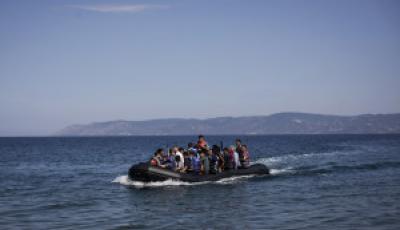Guest post by Stella Nanou, Communications/Public Information Associate, UNHCR Greece. This post is the second installment of the Border Criminologies Themed Week on the Migrant Crisis in Greece organised by Angeliki Dimitriadi.
Lately Greece has been experiencing several crises that are featured regularly in the media headlines. One of these, what has been often labeled as a ‘migrant’ crisis, is in fact a ‘refugee’ crisis. It’s a crisis because the numbers have soared, overstretching the resources and infrastructures on the Greek islands, despite efforts by local authorities and civil society actors. It’s a ‘refugee’ and not a ‘migrant’ crisis because the vast majority of people who’ve reached Greece this year in overcrowded, rickety boats come from places experiencing war and human rights violations, and are fleeing for their lives and not simply for a better life. The numbers speak for themselves: eight in ten people who have reached Greece so far this year come from Syria or Afghanistan, the two biggest refugee source countries worldwide, according to UNHCR’s latest global statistical report.
Albeit a crisis, the phenomenon of refugee flows in Greece isn’t new or unexpected. Towards the end of 2012, more robust surveillance systems and a 12 kilometer fence along the Greek-Turkish land border resulted in a shift from land crossings to the North and South-Eastern Aegean Sea. Since 2013, there has been acceleration with 43,500 arrivals in 2014 and 68,000 so far this year, surpassing for the first time the number of arrivals in Italy. This should come as no surprise―the UNHCR had sounded the alarm last year. The growing numbers in Greece, a country at the external borders of the EU and very close to regions of crisis and conflicts, echoes the sharp escalation of displacement at a global level: the highest number of people ever recorded, almost 60 million, half of them children, have been forced to flee their homes due to war or persecution. This translates to one in every 122 humans. And the main reason behind this increase has been the war in Syria, now the world’s single-largest driver of displacement.

- Monday, 13 July: In Search of Hospitable Spaces in Times of Crises at the Margins of Europe (A. Dimitriadi)
- Tuesday, 14 July: Greece’s Other Crisis [is Europe’s Crisis] (S. Nanou)
- Wednesday, 15 July: Migrants Arriving in Athens: No Reception and No Place to Go (K. Kuschminder)
- Thursday, 16 July: The Moral Economy of Migration among Afghans in Europe (A. Monsutti)
- Friday, 17 July: No Welcome for Migrants and Refugees Landing in Greek Dodecanese Islands (S. Kyroussis)
Any thoughts about this post? Get in touch with us! Send us an email, or post a comment here or on Facebook. You can also tweet us.
__________
How to cite this blog post (Harvard style):
Nanou, S. (2015) Greece’s Other Crisis [is Europe’s Crisis]. Available at: http://bordercriminologies.law.ox.ac.uk/greeces-other-crisis-is-europes-crisis/ (Accessed [date]).
Share:








